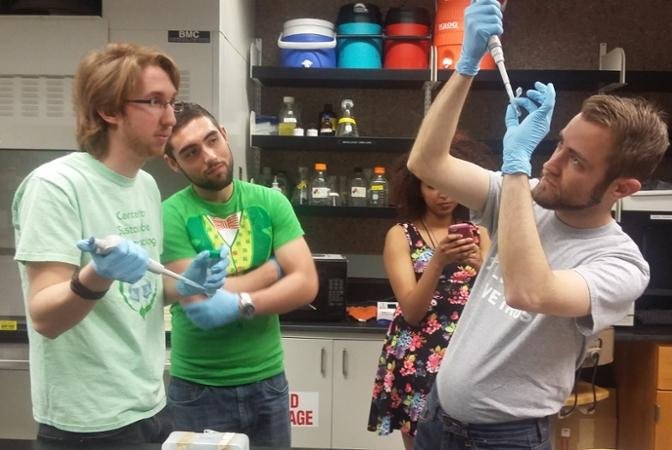Biology students like these at Colorado State University-Pueblo will be able to graduate with a cannabis degree starting in 2020, the university said. Photo courtesy of CSU-Pueblo
Feb. 12 (UPI) -- Addressing demand for scientific training that could prepare students for high-paying jobs in the marijuana industry, a branch of Colorado State University will offer science degrees in cannabis starting in the fall.
Studies in cannabis biology and chemistry at the university branch in Pueblo will be based on a curriculum that leads to an analytical chemistry degree and a natural products biology degree, said David Lehmpuhl, chemistry professor and dean of the College of Science and Mathematics.
"This is not a 'how to grow marijuana'-type degree at all. This is a science degree," Lehmpuhl said.
Job seeker site Indeed.com shows chemical analysts in the cannabis industry can earn salaries between $50,000 and $80,000 per year. The biology degree could be used at jobs involving formulation of natural products such as salves, skin treatments or supplements.
Upper-division science students can specialize in the cannabis track with 11 credits in "cannabis physiology and growth" and "medicinal chemistry and pharmacology," plus a seminar. Students will have to pass introductory biology or chemistry and organic chemistry, as well as physics and mathematics courses, to apply for four upper-division courses that focus on cannabis.
The biology track will include extra coursework in biochemistry, genetics and neurobiology, with "natural products extraction and analysis" lab work included. Chemistry students can specialize in the study of the chemical compounds of cannabis in "medicinal chemistry and pharmacology" and "medicinal plant biochemistry," also with lab work.
Current chemistry and biology undergraduates will be able to apply to graduate with the cannabis degree, Lehmpuhl said. The school expects about 60 students to enroll in the first year and believes the program will be able to accommodate 130 students.
Even if they wanted to, students can't get high with the plant material used in their classes, though.
The program will have no THC-laden marijuana on campus, Lehmpuhl said, but instead will work with federally legal hemp plants -- cannabis cousins of marijuana -- that have less than .3 percent of THC. CSU-Pueblo has a federal license to grow hemp.
"This program is totally federally compliant, and there will be no risks to a student's financial aid or campus financial funding," Lehmpuhl said.
Although recreational and medical marijuana have been legal in Colorado since 2014, the drug still is federally illegal, and listed as a Schedule 1 narcotic with the U.S. Drug Enforcement Agency as a drug with no medical use and high potential for abuse. Advocates of medical marijuana oppose this definition.
Colorado has earned more than $1 billion in tax revenue from state legalized cannabis sales. Some of that money has gone to fund the state's Pueblo-affiliated Institute for Cannabis Research, which has been growing and researching hemp under a program approved in May, 2019 by the state Legislature.
CSU-Pueblo, with 4,500 students and situated 115 miles south of Denver.
Southern Colorado has been called the "silicon valley" of cannabis, and multiple THC and hemp businesses are headquartered in and around Pueblo. The school hopes to partner with these businesses for internships and fellowships.
The Colorado Commission on Higher Education approved the new cannabis degree at a meeting last week, saying it would provide students with training for job opportunities that could extend to agriculture, food science, biochemistry and environmental sciences.
"This is the first program in the state, but I wouldn't be surprised if other institutions came our way looking for approval for their own programs," said Chris Rasmussen, the commission's director of academic affairs. Now that 11 states have legalized marijuana, it's important for the state to keep "a competitive edge in the industry," Rasmussen said.
As cannabis becomes more commonplace, he said, student demand will increase, just as it has for jobs in craft breweries in Colorado.
"A number of Colorado institutions that offer programs in fermentation, the science of beer-making, and that was something you didn't see before," he added. "Now it's completely normalized."
Colorado is not the first state to offer cannabis science degrees. Other public universities and even private certification programs have sprung up around cannabis.
In California, these include the University of California-Davis's Cannabis and Hemp Research Center and the Cannabis Research Initiative at University of California-Los Angeles.
The University of Maryland in Baltimore offers a master's degree, through its pharmacy school, in medical cannabis and therapeutics.
Northern Michigan University offers a bachelor's degree in medicinal plant chemistry. Smaller 2,000-student Lake Superior State University in Sault Ste. Marie, Mich., also offers a cannabis-based analytic chemistry program.
At Colorado State, Lehmpuhl said, the cannabis institute fields several requests per week for degree or certification programs. That's how state higher education officials knew a demand for the new degree existed.
"With this degree, students can go and work in a chemistry or biology lab in any industry, but they can also be employable in the new cannabis industry," he said.















